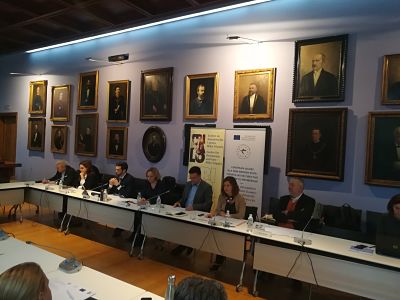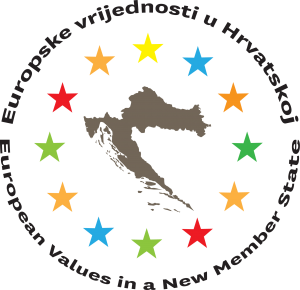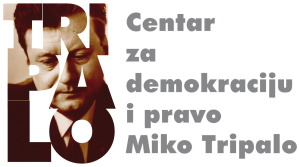Summary of presentations given during the panel on justice and the rule of law.
The first speaker on the panel on justice and rule of law was Susana Sanz Caballero from the University CEU Cardenal Herrera from Spain. She began her presentation by defining rule of law and explaining its basic elements. Sanz Caballero argued that the European Union has had a positive impact on candidate countries during the accession negotiations, but after their accession, the EU proved unable to solve the problem of declining levels of rule of law because the conditionality principle was basically unsuccessful. She compared the negotiation experiences of candidate countries form Southwestern Europe and those from Central and Eastern Europe. In the first case, no entry criteria were explicitly stated, while in latter case the Copenhagen criteria were introduced. When it comes to countries form Southwestern Europe, there was no mention of values or the conditionality principle, but they were introduced later. Finally, she spoke about and compared the declining levels of rule of law in Hungary and Poland.
The second speaker was Lora Vidović, Ombudswoman of the Republic of Croatia. Vidović stressed that the rule of law is not just a theoretical concept, it needs to be internalized as a value. She used the example of Finland as a county that emphasized the rule of law as a priority during the Council of the European Union presidency. She said that 60% percent of Croatian citizens do not trust the judiciary and believe that their position is not equally valid before the law. A major problem is the non-functioning of the free legal aid system which is not available outside of urban centers where 50% of elderly people live in a risk of poverty. She underlined long judicial processes, increased number of lawsuits against media and migration as problems within the legal system. If there is no investigation against those public officials who abuse their power, Vidović claims, there is no protection against autocracy. Civil society as an area of freedom needs to be protected.
The next speaker was Goran Selanec, a judge on the Croatian Constitutional Court. He initially questioned whether the Court of Justice of the European Union can identify solutions for the downfall of the rule of law and whether it has strategies to prevent its undermining. Selanec argues that the discourse on the protection of human rights was predominant in the past few years. Today this is changing and the discourse on the protection of judicial independence has become a priority. The attack on the judiciary, according to Selanec, comes from executive and legislative authorities; a process that undermines constitutional democracy which does not exist without an effective division of power. He stated that from February 2018 to December 2019 there have been only seven important verdicts concerning the independence of the judiciary, a number which is extremely low. He argues that citizens need to be subjected to value-based legal regulations, not partial solutions. The attack on the rule of law is easiest by attacking the courts; when mutual trust disappears the rule of law ceases to function.
Josip Kregar from the Faculty of Law at the University of Zagreb had a presentation on populism and the rule of law. Populism grows in accordance with the growth of social uncertainty and anxiety. In Croatia we want to keep the judicial independence, but those who work in the justice system want to use their independence for their own interests. Changing this is impossible without internal resistance which is currently lacking. Populism, as such, relies on social regression, said Kregar, and believes that it can further grow with new communication channels for example social networks which makes those ideas easy to spread. Democratic institutions and their design are partially responsible for the growth of populism.
The last presentation on the first panel was by Ivana Krstulović Baković from the SUNCE Association. She spoke about environmental protection, which is no longer a theoretical human right, but it is increasingly manifested as a legal issue. Nowadays, we are witnessing environmental protection as a human right becoming established as a public-law interest. Citizens and civil society organizations should serve as the „voice“ of the environment and nature. Krstulović Baković noted that education of public officials and administrative court judges is needed, as well as raising awareness in society of the legal principles of environmental protection. She reiterated that environmental and nature protection is based on the precautionary principle.
Europske vrijednosti u novoj državi članici: Hrvatska u prvih pet godina članstva u EU
European Values in a New Member State: Croatia in the First Five Years of EU Membership



